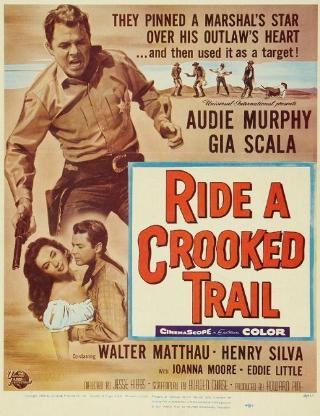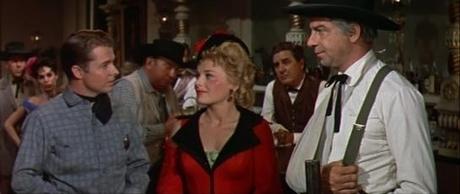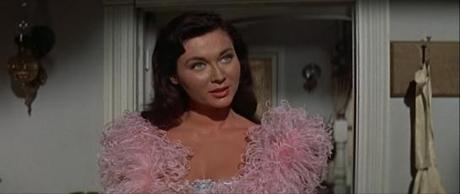
Anyone who has been a regular, or even occasional, visitor to this site will be aware of my fondness for westerns of the 1950s. And even a cursory glance through the various pieces I’ve written on these movies will reveal a particular term that crops up again and again – redemption. It was the overriding theme of westerns of the period and there’s no getting away from it. Such a concept inevitably involves a form of atonement for sins of the past and/or a coming to terms with the pain of the present. Superficially, revisiting this theme may appear either grim or formulaic, but I’ve found that this is rarely the case. It really boils down to the approach adopted by the filmmakers and the spin they put on it all. Ride a Crooked Trail (1958) is at heart another tale examining the journey towards redemption but comes at it from a slightly unexpected angle, a refreshingly lighthearted one.
The movie hits the ground running, literally. The first image is of a rider galloping across open country, with another horseman hot on his heels. As the pursuer smoothly unsheathes and fires his rifle the fugitive has his mount shot out from under him. Scrambling to his feet, he scurries off towards the protection of rocks and high ground. But it’s an illusory form of shelter masking a precipitous drop into a deep chasm. Still this man is nothing if not lucky as a misstep by his hunter sees him plunge over the edge to his death. The fugitive is the wonderfully named Joe Maybe (Audie Murphy), a would-be bank robber running from the law. Taking the dead man’s gear with him, he rides into the nearest town and immediately finds himself in a tricky situation. In the absence of a marshal the shotgun-toting Judge Kyle (Walter Matthau) is the sole representative of the law and just happens to be on the lookout for a wanted man by the name of Joe Maybe. Just as it looks as though our hero has leaped from the frying pan into the fire, another stroke of dubious good fortune arises. The man whose outfit he took possession of happened to be a marshal of some repute by the name of Noonan, known far and wide for his distinctive broken star badge. Kyle, whose penchant for dispatching miscreants with his shotgun is matched only by his fondness for the whiskey bottle, automatically assumes that Joe is actually Noonan and welcomes him warmly. In fact, he duly appoints Joe town marshal and seems thrilled to have his burden lightened. Joe is initially reluctant to run with this masquerade but, ever the opportunist, sees the potential for an easy score in a trusting town that’s soon to be swimming in money from the trail drives. Yet complications soon appear: the arrival of an old acquaintance, Tessa (Gia Scala), signals both temptation and imminent danger. Tessa’s lover is Sam Teeler (Henry Silva), a ruthless type also eying the lucrative prize in the bank vault. And on top of this the gradually dawning suspicion of Kyle, the kindness of the townsfolk and the adoration of an orphaned boy all begin to prick at Joe’s conscience.

Ride a Crooked Trail was scripted by the prolific Borden Chase, a writer whose work often wove lighter elements into generally serious stories. While this film isn’t a comedy there are strong comedic aspects, especially evident in the arch, knowing dialog and the innuendo-rich circumstances surrounding Joe’s enforced domestic arrangements. As I said at the beginning, everything revolves around Joe’s path towards redemption. There’s adversity to be overcome and ghosts to be laid, but the performances, Chase’s script and Jesse Hibbs’ direction all add a sense of warmth to the film that sets it a little apart from other variations on this traditional theme. Where many other 50s westerns trade on intensity, fatalism or psychological complexity, Ride a Crooked Trail has heart and sincerity.
I get the impression that Audie Murphy tends to be viewed as a kind of standard western hero, a straight arrow if you like with the minimum of complexity. However, his best performances, and there are more of those than many would have you believe, point out the fallacy in that assumption. Murphy was a man deeply affected by his wartime experiences but the heroic image and clean-cut looks helped disguise that. When the occasion or role demanded he was able to channel a degree of ambiguity and in Ride a Crooked Trail we see some of that beneath the surface good humor. Even the name of his character, Joe Maybe, is suggestive of moral ambivalence. I think one of the best scenes in the movie is the quiet little interlude where Murphy chats with the orphan about growing up alone, the judgments made based on dubious ancestry and the road one is expected to follow. As it develops we learn more about Joe’s own past and even the origin of his curious name, although I think the explanation of the latter would actually have been better left unsaid. Either way, it’s an affecting and subtle little scene well-played by Murphy. The film also benefits from fine support from Walter Matthau and Gia Scala. Matthau was an immensely talented comic actor and I feel he struck the right balance here between comedy and drama, the judge coming across as simultaneously sardonic, ornery and cunning. The private life of Irish-Italian actress Gia Scala was one of those Hollywood tragedies, a sensitive beauty whose shyness led to alcohol problems and an early death. On screen though she was sassy and confident, and more than held her own with Murphy and Matthau. Now if ever a man was born to play villains, then it was surely Henry Silva. The man had a real knack for portraying menace, and it’s too bad he doesn’t get more screen time in this film.

At one time Ride a Crooked Trail wasn’t the easiest film to track down on DVD but it’s now fairly widely available in the US and Europe – incidentally, I see that a company called 101 Films have this title along with a raft of other Universal westerns up for pre-order at Amazon UK. I have the German edition released by Koch and it’s a typically strong effort. The anamorphic scope transfer is colorful and detailed and displays little in the way of damage. There’s the choice of viewing the movie with the original English soundtrack or a German dub, and there are no subtitles of any kind to worry about. The extra features consist of the theatrical trailer, a gallery and an inlay leaflet in German. In many ways this can be seen as a typical late 50s western, which is far from being a bad thing, but the lighter, warmer atmosphere gives it an extra bit of charm in my eyes. I don’t think I’d place it up with the very best Audie Murphy westerns but it’s still a strong piece of work, and I reckon it’s a rewarding film to watch.
